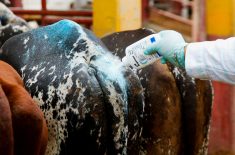Owners of captive wildlife or “controlled animals” in Alberta may soon be billed for the province’s costs to round up escaped or illegally released animals.
The provincial government on Tuesday announced the introduction of amendments to its Wildlife Act that it said will allow for more effective wildlife control.
“The changes will help avoid confusion in provincial courts and allow fish and wildlife officers to deal with offences and conduct wildlife control measures more effectively,” Sustainable Resource Development Minister Ted Morton said in a release.
Read Also

Mexico agriculture secretary says still no date for restarting cattle exports to U.S.
Mexican Agriculture Minister Julio Berdegue said on Wednesday that Mexico and the United States have not yet set a date to resume Mexican cattle exports amid an outbreak of the flesh-eating screwworm parasite.
The bill, if passed, would “assess owners of captive wildlife or controlled animals with the costs of transporting, recapturing or euthanizing animals that were kept in lawful captivity and escaped or were unlawfully released.”
“Wildlife management is challenging and continuously changing, and these amendments will eliminate certain challenges in administering and enforcing the Act,” Medicine Hat-area MLA Len Mitzel, the new bill’s sponsor, said in Tuesday’s release.
The bill would also authorize provincial fish and wildlife officers to have “increased access to land to respond to wildlife issues and monitor hunting activities.”
It would also allow for a “creative sentencing” option requiring someone convicted of a Wildlife Act offence to pay restitution to someone who has incurred a financial loss due to the offence, the province said.
It also contains language that the province said will “clarify the evidence required to prove that edible flesh has been wasted or become spoiled.”
As well, the bill would set a higher range of penalties that courts can impose on those who export wildlife or wildlife parts that are banned from export, the province said.











